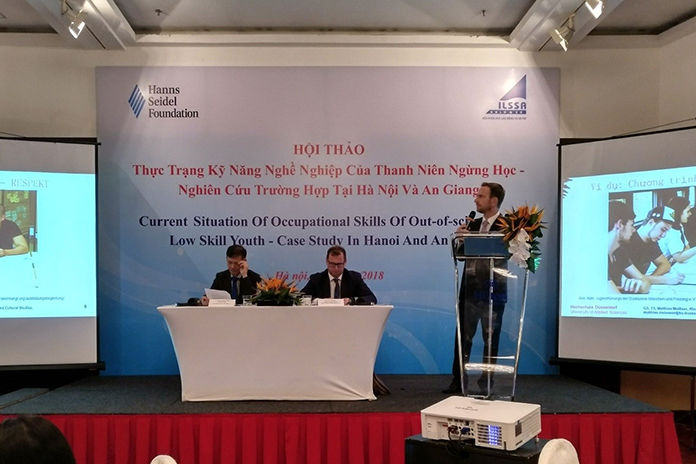HSF and ILSSA host workshop on NEET youth
Addressing the Problems of Out-of-School and Low Skill Youth in Ha Noi and An Giang

Dr. Matthias Meissner gives a presentation on vocational training in Germany.
HSF
On the 19th of September, HSF and the Institute of Labour Science and Social Affairs (ILSSA) hosted a workshop on the subject of out-of-school and low skill youth in Vietnam, specifically in Ha Noi and the province of An Giang as a case study was conducted in both locations. In the opening remarks made by Dr. Axel Neubert, the Vietnamese workforce is estimated to be at around 55 million people. However, 75% of them only have basic or no qualifications, most of them don’t even have vocational training. These low-skill workers will have difficulties learning and adapting to new technology and they are also at greater risk of unemployment. The unstable national workforce is a major issue that needs to be addressed, as it will affect the labour market, the productivity of the economy and the capacity of social security.
At the beginning of the workshop a report was presented by ILSSA offering solutions towards the development of skills to address employment challenges for out-of-school/low-skilled youth. The research was conducted through analysis of available data with some target groups over the course of this year. The report has stated that in the second quarter of 2018 the youth unemployment rate was high at 7.1 percent as the majority of youth ‘do not meet the required qualifications and skills’ of the labour market. It has also provided the following recommendations for aiding low-skilled youth:
(1) Build a learning society and raising the learning awareness for youth to improve their professional skills
(2) Support out-of-school and low-skilled youth with access to vocational training
(3) Improve the quality of vocational training to meet market demands, addressing job challenges for out-of-school and low-skilled youth
(4) Enhance the role of enterprises in providing training for out-of-school and low-skilled youth
(5) Strengthen the role of job placement centres in providing labour market information, career orientation counselling and job placement for youth
The report has been met with a positive response from national educational directorates and institutes, who have praised the research behind it and conclusions drawn from the research. However, they have also offered recommendations regarding the usage of terminology and deeper analysis.
The workshop concluded with a presentation on vocational training policies in Germany by Dr. Matthias Meissner of the University of Applied Sciences in Dusseldorf; and a report on the current situation of vocational training in An Giang Province by the Department of Labour, Invalids and Social Affairs of the province. Both of these presentations have given both a local and international insight into the importance of vocational training for low-skilled youth.
In the end, both the foundation and ILSSA managed to bring critical attention to the need of vocational training and the reformation of the educational system to cater to low-skilled and out-of-school youth. It is a sign of better things to come in the near future.
